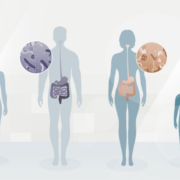By Mary Ellen Sanders, PhD
At the ISAPP meeting earlier this month, Prof. Dan Merenstein, MD, presented a summary of recent ISAPP initiatives focused on helping translate the evidence of probiotics and prebiotics into clinical action.
A 2013 paper reported that 87% of hospital formularies surveyed in the United States carried at least one probiotic. Yet when Merenstein looked at the names of the products tested, many were not supported by evidence for such uses. This highlights the need for clinicians to have access to clear, evidence-based probiotic use guidelines.
ISAPP has worked through a variety of avenues to get information into the hands of clinicians. It has supported continuing education credit activities, webinars, collaboration with clinical organizations to develop guidelines, publications in clinical journals, presentations at clinical meetings, and simplified summaries using infographics and videos. Some examples include the following.
World Gastroenterology Organisation Global Guidelines – Probiotics and Prebiotics
This document is the most visited and downloaded of all WGO guidelines. In 2017, under the leadership of Prof. Francisco Guarner, MD PhD, this document was updated. Three current ISAPP board members were part of the process and ISAPP provided funding. See here.
Petitions
ISAPP petitioned the United States Preventive Services Task Force to examine the role of probiotics in preventing antibiotic-associated diarrhea. They considered the petition, but didn’t feel it fit their mission.
ISAPP petitioned American Academy of Family Physicians to consider reviewing the evidence for probiotics for AAD to include in their evidence-based guidelines. This is under consideration.
After attending 2017 ISAPP, Dr. Claire Merrifield BSc MBBS PhD led an effort to have NICE Clinical Knowledge Summaries mention probiotics for AAD in an effort to get local groups to adopt guidelines. This has met with limited success. See here.
CME or CE activities
On April 17, 2018, Merenstein and Mary Ellen Sanders PhD served as faculty for a CME-eligible webinar sponsored by Medscape on “Navigating the World of Probiotics. Helping Patients Make Good Choices”. The activity is available on Medscape’s website here.
In February 2018, Merenstein published a CE activity with the Pharmacy Times titled “The Expanding Health Benefits of Prebiotics and Probiotics”. See here
Upcoming in October 2018, Merenstein will present “Probiotics and the GI Tract. What Should a Busy Clinician Know” at the American Academy of Family Physicians Annual Conference. This conference is attended by over 4,000 physicians and is focused on clinical practice. The event, eligible for CME, will be recorded and made available after the live presentation.
ISAPP co-founder, Prof. Glenn Gibson has or will present 6 lectures over 2017 and 2018 on the topic of “The Learning Curve for Probiotics and Prebiotics.” These lectures are available for CME credit and are targeted to family doctors, gastroenterologists, pediatricians, and dieticians in the UK.
Numerous CME presentations over 2017-2018 have been given by ISAPP board members:
M.D. Cabana:
- “Probiotics: Friend or Folly?” American Academy of Pediatrics National Conference and Exhibition. Chicago, IL. September 17, 2017. The audience was about 450-500 clinicians.
- “Probiotics in Primary Care Pediatrics: Diarrhea, Colic & Eczema.” American Academy of Pediatrics California Chapter 1 Meeting. 300 clinicians
- “Probiotics for Colic?” Zuckerberg San Francisco General Hospital. Department of Pediatrics Grand Rounds. San Francisco, CA.
- “Probiotic Interventions for Colic” UCSF Benioff Children’s Hospital, Oakland.
- Reid:
- “Effects and importance of microbiota on urogenital health in women.” 16th Annual Congress of Gynecology and Obstetrics, Antalya, Turkey. 300 obstetricians and gynecologists.
- “Probiotics to whom for what?” Health World Ltd International Congress Natural Medicine 2017, Hunter Valley, New South Wales, Australia,.601 healthcare practitioners and naturopaths.
- “The microbiome and how it relates to maternal/newborn care.” The Graham Chance Lectureship, Perinatal Research Day, London, ON. 100 neonatologists and pediatric experts.
- “Microbes and the brain.” Integrative Healthcare Symposium, New York City. 500 naturopaths and various specialists.
- “Probiotics and detoxification.” Environmental Health Symposium, Scottsdale, Arizona, 8th April. 500 naturopaths and various specialists.
Webinars
On June 28, ISAPP co-founder, Prof. Glenn Gibson, will present a webinar along with Profs. Ted Dinan and Ian Rowland titled “Why is everybody talking about gut microbiota?” Sponsored by the British Nutrition Foundation, this webinar will target healthcare professionals in the UK and Europe. See here.
Publications in clinical journals
Several ISAPP board members
- Evidence-Based Probiotic Use in Family Medicine. Submitted, Journal of Family Practice. Merenstein/Sanders/Tancredi
- Probiotics for Human Use. In press, Nutrition Bulletin. Sanders/Merenstein/Hutkins/Merrifield
- Probiotics and prebiotics in intestinal health and disease: from biology to the clinic. Invited review in preparation, Nature Reviews Gastroenterology and Hepatology. Gibson/Reid/Sanders/Merenstein
- Clinical perspectives of prebiotics and synbiotics. In preparation, Gastroenterology. Gibson/Quigley
Featured on ISAPPscience.org
Infographics
Videos
- What is a probiotic?
- Health benefits of probiotics
- Are all probiotics the same?
- How to choose a probiotic
General guidelines for choosing probiotics and prebiotics
Some initiatives that Merenstein championed were a direct result of ideas generated during the discussion group he led during the 2017 ISAPP meeting in Chicago.








